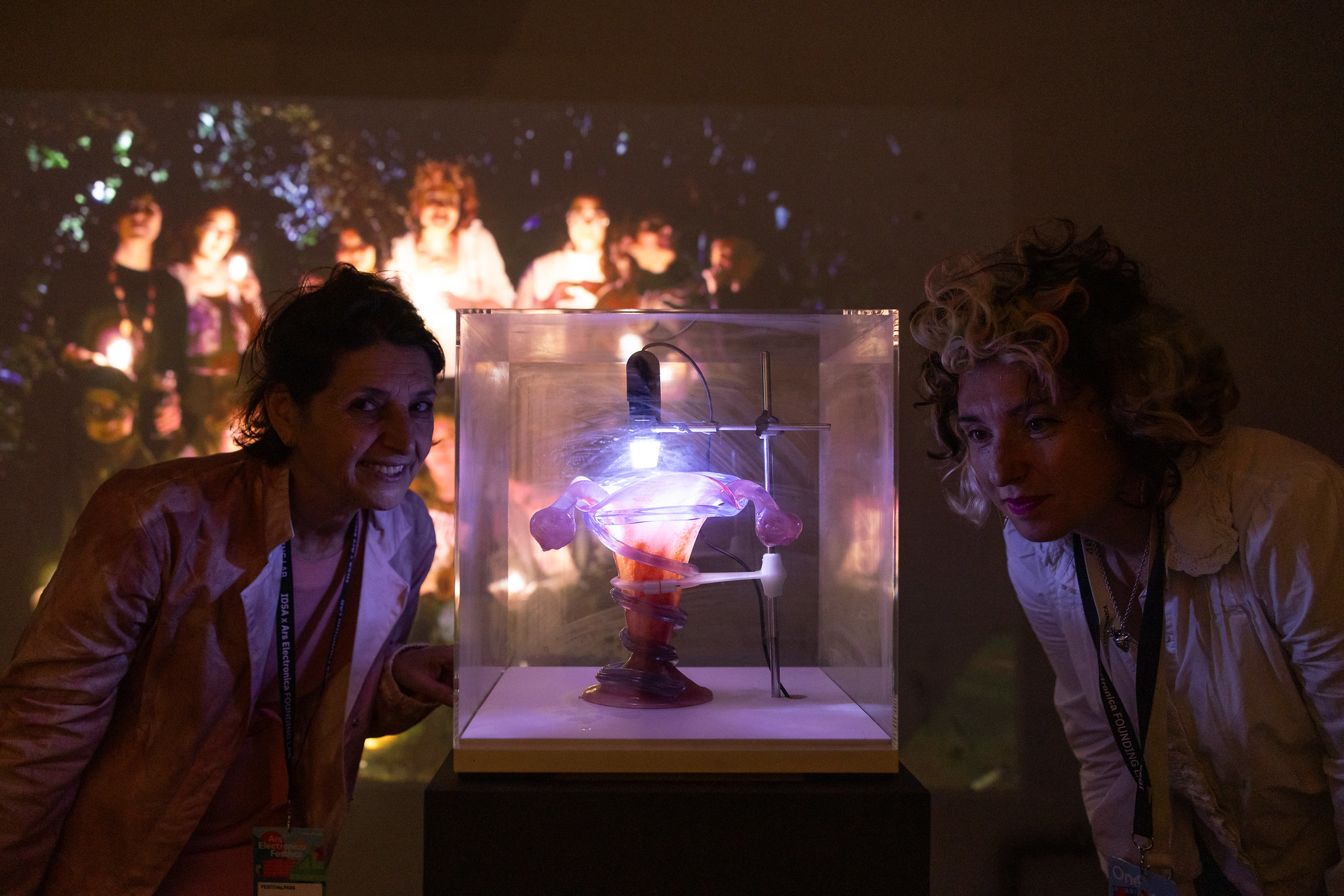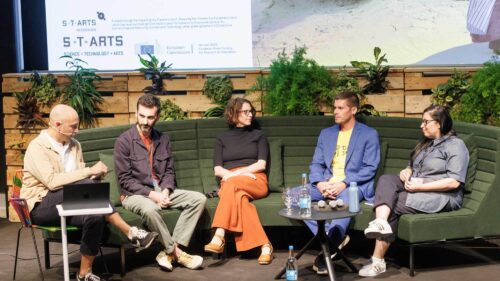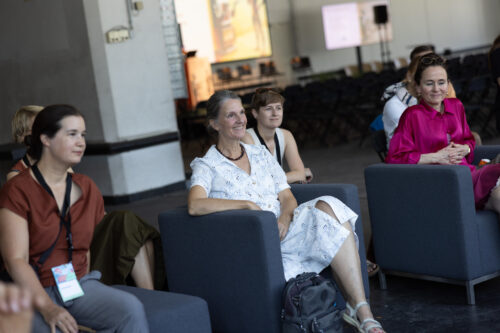With its Linz location, Ars Electronica is not only situated at the geographical heart of Europe, but also positions itself as a hub of European cultural intersection as partner institution in numerous collaborative EU-supported projects.
These international collaborations with other institutions and organisations in the cultural and creative sector inspire and facilitate exciting alliances between artists, researchers and industry representatives in multidisciplinary projects, all in the spirit of a united Europe.
The development and implementation of European cultural cooperation projects under Creative Europe, Horizon 2020 / Horizon Europe and Erasmus+ have become a cornerstone of Ars Electronica’s engagement with the sector. In these collaborative approaches, we see ourselves as a European Platform for Digital Humanism, a space for conversation and reflection to foster and showcase the outcomes of artistic engagement with science, technology, and society.
Ars Electronica’s efforts focus on exchange within the sector on the one hand, and the discourse between the sector and society as equals on the other. Critical artistic discourse on technologies, societal discussion through transdisciplinary cultures, and the cultural and creative industries’ reflection on their digital futures in the context of the Next Renaissance movement and beyond: these are the focus points of our perspective on how Digital Humanism can lead more-than-human societies into a liveable future.
The Next Renaissance
The world stands on the cusp of a rare opportunity to shift our systems and way of thinking, planning and acting dramatically, as a mood is emerging that transformation is possible. The solutions are in the air and renewal is possible. Perhaps a rebirth – a Next Renaissance, where we harness our collective imagination and intelligence and work across different forms of knowledge. Here we can rethink how to organize our economy on different principles and base our society beyond mere self-interest, as well as–importantly–redefine our relationship to nature given the dangers of climate collapse.
Initiated by EIT Culture & Creativity, The Next Renaissance is a movement and a platform that aims to promote the need to dramatically reassess our ethics, values and priorities in addressing the major problems of our times. The creative and cultural sectors, and especially the blending of scientific, technological, cultural and artistic knowledge, can be a catalytic driver to both imagine possible futures and to help make them happen. To tap into the great potential of the sector for the evolution of human societies, we need to provide infrastructures and support systems that facilitate and accommodate radical new paths of thinking, both to artists and industries.
Ars Electronica participates in two large-scale initiatives of the European Commission that are in line with The Next Renaissance’s belief that innovation and cross-innovation by culture and creativity is the key to the future of Europe. The STARTS Initiative and EIT Culture & Creativity provide frameworks within which a paradigm shift in how we think, plan and act becomes possible. EIT Culture & Creativity’s flagship initiative The Next Renaissance provides an umbrella for these two approaches.
S+T+ARTS Initiative
The climate crisis is no longer a prediction of a distant future but increasingly a reality of our time. Undoubtedly, we need to rethink our economies, societies, modes of inhabitation, and our relation to the planet. For this, instead of off-the-shelf solutions, we need multi-layered, trans-disciplinary approaches to innovation.
STARTS is an initiative of the European Commission designed to create a space of dialogue and collaboration between Science+Technology+Arts. It gives artists a voice in innovation processes. Through various STARTS pillars, the STARTS Academies, STARTS Lighthouse, STARTS Residencies, the STARTS Prize and the numerous Regional STARTS Centres, the initiative address the need to approach innovation differently and look for radically new ways to tackle the challenges we face. Artists can be catalysts for change and imagine solutions that have the boldness our challenges demand.
Ars Electronica has been part of this important initiative from the very beginning, hosting the STARTS Prize since its inception in 2016. The Grand Prize of the European Commission Honoring Innovation in Technology, Industry and Society Stimulated by the Arts highlights people and projects that have the potential to make a sustainable positive impact on Europe’s economic, technological, social and ecological future. The competition seeks projects at the nexus of science, technology and the arts and celebrates visions and achievements at the interface between innovation and creation. In 2024, the Prize will be awarded in a special category: the STARTS Prize for African artists and institutions, to single out for recognition innovative projects that have what it takes to make a significant impact on economic and social innovation.
Within the STARTS4Africa project, European structures experienced with STARTS approaches will partner with change-makers in Sub-Saharan Africa as well as existing Digital Innovation Hubs (DIH) to push for innovation on a regional level. This is to be facilitated by the involvement of local and international artists with regional stakeholders. In addition to the STARTS Africa prize, this will also be achieved through a Residency program. At this year’s Ars Electronica Festival, the network will be introduced.
Residencies are also at the core of the Regional STARTS Centers implemented by STARTS in the City. The project aims at enhancing art-driven innovation at local level and human-centered technologies, such as artificial intelligence, robotics, new digital media, smart cities, high performance computing, data science, or biotechnologies, that will be able to bring to the market products and services that have a positive ecological, societal, and ethical impact. Discussions of these topics will shape this year’s discursive Festival program.
-
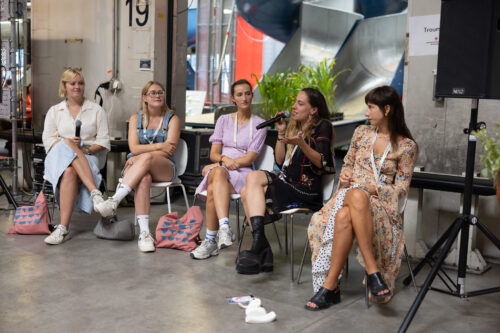
ALMA Toolkit
Giulia Tomasello (IT), Isabel Farina (IT)
Join us for the ALMA Toolkit Workshop, an empowering event aimed at addressing crucial knowledge gaps in vaginal health and promoting self-management of intimate health. ALMA Toolkit is a set of educational materials and tools designed to democratize and destigmatize intimate health learning. It encourages self-awareness, self-exploration and self-management of the body.
-
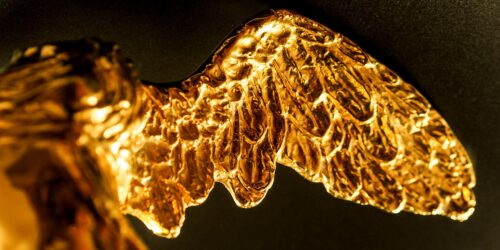
Award Ceremony (with invitation only)
Bei der feierlichen Überreichung der Goldenen Nicas des Prix Ars Electronica 2023, der STARTS Prizes’23 und der Verleihung der großartigen neuen Preise der Europäischen Union und unserer Kooperationspartner stehen die diesjährigen Preisträger*innen mit ihren ausgezeichneten Projekten im Mittelpunkt.
-
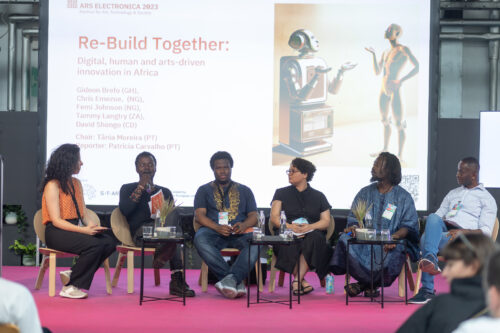
Re-build Together: Digital, human and arts-driven innovation in Africa
Gideon Brefo (GH), Chris Emezue (NG), Femi Johnson (NG), Tammy Langtry (ZA), David Shongo (CD)
In this conversation, we will discuss ways to re-build the story and pathway of our countries and continents, seeking to know and understand the role that digital, human and arts-driven innovation is and can play in Africa.
-
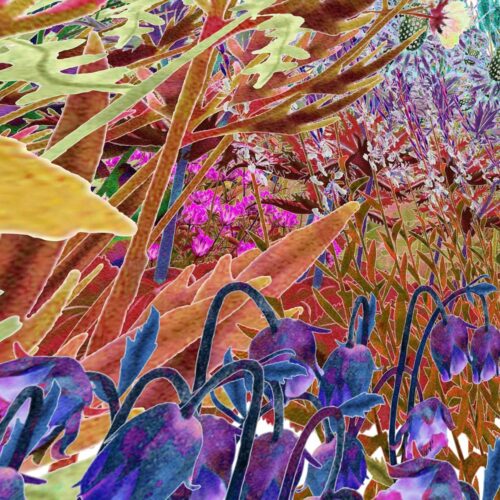
S+T+ARTS Prize Exhibition
Die diesjährige Ausstellung ausgewählter S+T+A+RTS Prize Projekte zeigt das Potential aktueller künstlerischer und kreativer Ansätze um Lösungen für ökologische, technologische und sozioökonomische Probleme anzustoßen.
-

The Anoiksis Experiment
Jennifer Kanary (NL)
How does your Anoiksis work? The Anoiksis Experiment is an artistic thought installation of a single word: “Anoiksis” that represents our creative survival mechanism. Understand Anoiksis and we may not only understand how we build our realities, but also how to reserve space for deviating realities.
CCI Thrive
CCI Thrive — Bespoke Business Models and Innovative Practices of Cross-Sectoral Cultural and Creative Collaboration explores compelling solutions for small and medium-sized European Cultural and Creative Industries (CCI) enterprises as a response to the obstacles that they are facing. How can cutting-edge digital technology support CCI in improving their international competitiveness? How does the fact that these technologies are all relying heavily on data affect the CCI sectors in keeping pace with the digital transition? Exchange of knowledge on these questions and joint efforts to achieve beneficial cross-sectoral solutions feeds into innovative business models. A data-driven workflow using intelligent tools and processes is developed in an experimental environment to demonstrate digital paths for the future of the sectors. The project’s core objective is to provide a sound body of knowledge to build sustainable, future oriented business models.
CCI Thrive reaches out to sectors throughout the CCI and involves a range of relevant experts. To onboard solutions, the project negotiates with many pan-European CCI platforms, registers and databases, as well as practitioners in various fields. The results consist of recommendations for cross-sectoral use, for example, sharing of data and tools providing the best sustainable support for the CCI, including micro companies and SMEs. CCI Thrive shows the value of cross-sectoral business models for the CCI that are innovative and viable along the value chain to make excellent use of data and digital technologies to improve their business and competitiveness.
For the cultural sector, CCI Thrive focuses on non-financial, value driven business models. At this year’s Ars Electronica, experts discuss existing approaches of cultural institutions to societal, environmental and educational value creation and work on recommendations for both practitioners and policy makers to shape the future of the cultural value creation in a data-driven world.
-
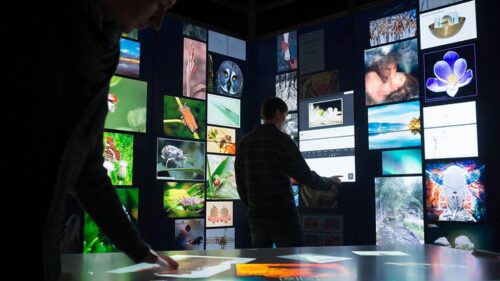
CCI Thrive Workshop
Alice Bonnot (FR), Ewen Chardronnet (FR), Archana Prasad (IN), Anke Schlünsen-Rico (DE), Rasa Bočytė (LT), Olga Tykhonova (UA/AT), Bill Fontana (US), Jennifer Kanary (CA), Florian Weigl (NL), Kelly Hazejager (NL), Pau Alsina (ES), Gefion Thuermer (UK), Andrea Bandelli (NL), Petra Vanič (SL), Marco Cappellini (IT)
The workshop will focus on cultural Business Models, particularly related to non-financial value creation in the cultural sector with an innovative approach to change our behaviors, increase our knowledge and raise public awareness.
-
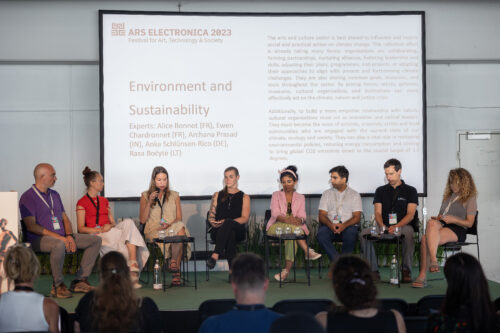
On Culture and Measurement: New Approaches for the Common Good
Scientific and quantitative results are the cornerstone of what we consider the truth today. Digital transformation and data-driven methods can not only help the cultural and creative sectors and industries (CCSI) to thrive but can also be fueled with inspirations from these sectors to further amplify their impact.
More-than-Planet
To envision a sustainable future requires a new perspective—a planetary perspective. This change in viewpoint is needed so that we can grasp the complexities of our ecosystem Earth. More-than-Planet (MtP) addresses a crisis of planetary imaginary by exploring how transdisciplinary cultures can contribute to the way people understand and envision our environment on a planetary level.
More-than-Planet continues Ars Electronica’s mission to contribute to European cultural-environmental literacy. Through a ‘comparative planetary imaginary’, the project aims to empower European research, innovation, and cultural communities with novel insights, skills, tools, and concrete use-cases. These can then be implemented within each of their respective domains. These imaginaries will be developed through transdisciplinary, collaborative and art-driven innovation approaches that utilize critical and creative tools to address our environmental emergencies.
More-than-Planet aims to have long-term impact by developing a pathway toward the framework of European Cultural Outer-Space Activities (ECOSA) in collaboration with relevant stakeholders. Such a framework will serve as a mutual agreement between stakeholders on collaborating in the long run. It builds on decades of individual efforts by many artists, scientists and cultural organizations who have enabled artistic production in the context of outer space, with space technologies, or even in outer space itself. This includes previous projects undertaken at Ars Electronica such as SpaceEU. The resulting projects are disseminated as novel environmental narratives at the Ars Electronica Festival, and across other cultural and public spaces, including specific critical zones.
-
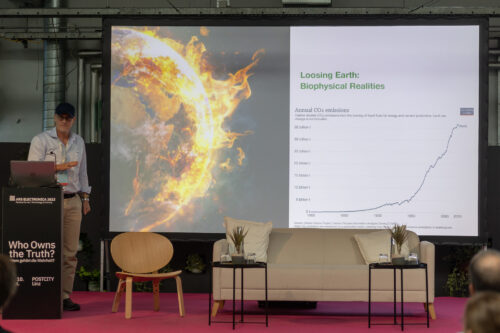
Ars Electronica Theme Symposium: (Un)Earthing the Truth – Ownership and Narratives about the Planet
A More-than-Planet Conference
Through interactive sessions, keynotes, panels and workshops, we contemplate the true value of ownership and how it all relates to our relationship with nature. From the ethics of space exploration to the governance of deep-sea resources, we ask what truly is ours and how we can solve pressing problems through innovative financing of our global…
-
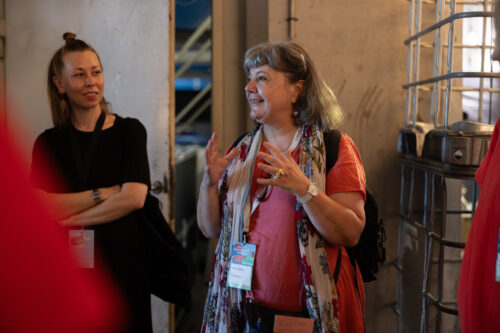
Expert Tour mit Annick Bureaud: Terraforming Earth – Decolonizing Space
Annick Bureaud (FR) / Leonardo/Olats
Mit “Terraforming“ wird der Prozess beschrieben, mit dem wir andere Planeten umgestalten möchten, um sie für uns bewohnbar zu machen. Kolonialisierung ist zum Synonym für Aneignung und Ausbeutung geworden. Wir werden uns mit diesen beiden Begriffen befassen und anhand von drei Kunstwerken aus der Ausstellung erörtern, inwieweit sie für einen Rückblick auf die Geschichte der…
-
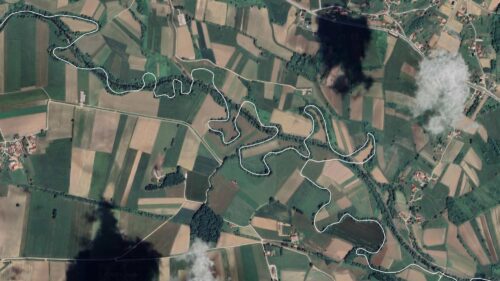
Expert Tour mit Miha Turšič: Mattering
Miha Turšič (SI/NL) / Waag Futurelab
„Matter“ kann sowohl als Substantiv als auch als Verb verstanden werden: Es geht um Material und um Fürsorge. Mattering ist die untrennbare Wechselwirkung zwischen der Schaffung von Fakten und Werten und den kulturellen und gesellschaftlichen Strukturen, die aus dieser dynamischen Beziehung entstehen. Die Art und Weise, wie wir uns unseren Planeten vorstellen, beeinflusst unser direktes…
-
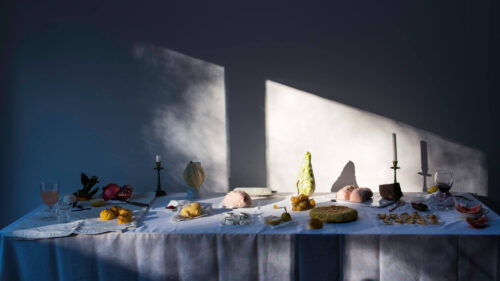
Planetary Mattering
Miha Turšič (SI/NL)
It matters which planet we portray, and which one we do not. In this workshop, participants will learn about ways of mattering. With this term, we refer to the images, interests and facts that shape our image of the planet, and, in turn, how the solidification of these imaginaries determines the way we talk about…
-

Planetary Public Stack
Miha Turšič, Waag Futurelab (SI/NL)
Strategic tools for researchers, creatives, artists and designers to better engage in socio-environmental transitions towards building heterogenous and inclusive understanding and expressions of shared planetary views, concerns, interests and heritage.
-
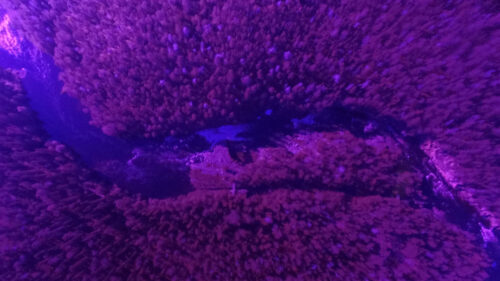
Systemic Change in the Times of Polycrisis
Antti Tenetz (FI), Tero Toivanen (FI)
The workshop “Systemic Change in Times of Polycrisis” explores how we can broaden our horizons and find sustainable solutions to the polycrisis caused by ecological emergency. It focuses on radical change in industrial societies. The perspectives of polycrisis will be linked to local examples that will be explored through the work of artists, researchers and…
-
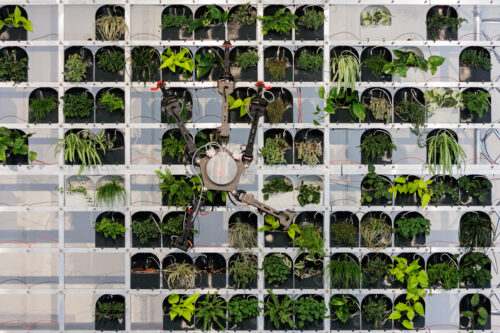
Theme Exhibition: (Co)Owning More-than-Truth
Die große Ausstellung in der POSTCITY nimmt sich der Frage „Wem gehört die Wahrheit?“ an und beleuchtet das Thema des diesjährigen Festivals aus vielfältigen Perspektiven.
IMPETUS
Citizen Science continues to gain momentum, assuming an increasingly pivotal role in researcher and innovator engagement with society. Citizen Science can demonstrate the potential of transdisciplinary cultures, and how methods of co-creation and co-design can bring together diverse communities and engage a variety of stakeholders, while creating, sharing and incorporating divergent forms of knowledge and approaches to knowledge creation.
IMPETUS is a project that showcases how Citizen Science contributes significantly to crucial societal issues such as digital literacy, data justice and participatory governance. Citizen Science heightens trust in scientific expertise, augments critical thinking skills, and creates a robust defense against misinformation. IMPETUS is committed to reinforcing and enhancing the European Citizen Science ecosystem by extending financial aid and strategic support to Citizen Science initiatives throughout Europe.
The project offers innovative funding pathways for Citizen Science initiatives through the IMPETUS Accelerator Program. In addition, IMPETUS hosts the European Union Prize for Citizen Science on behalf of the European Commission. The purpose of this prize is to broaden the recognition and disciplinary engagement of Citizen Science by honoring collaborative and diverse approaches that empower civil society and citizens in the development of the future. At this year’s Festival, Ars Electronica awards the European Union Prize for Citizen Science for the very first time.
-

Award Ceremony (with invitation only)
Bei der feierlichen Überreichung der Goldenen Nicas des Prix Ars Electronica 2023, der STARTS Prizes’23 und der Verleihung der großartigen neuen Preise der Europäischen Union und unserer Kooperationspartner stehen die diesjährigen Preisträger*innen mit ihren ausgezeichneten Projekten im Mittelpunkt.
-
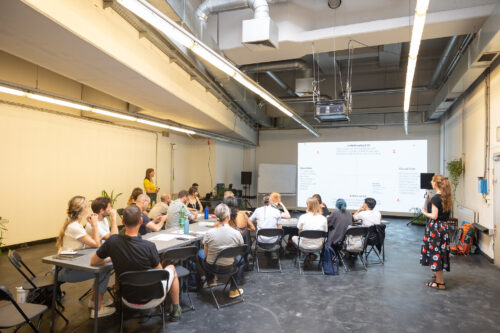
Citizen Science Futures for Sustainability
Aleksandra Berditchevskaia (GB), Alexandra Albert (GB)
This workshop seeks to define desirable futures for Citizen Science (CS) in Europe for mitigating and adapting to the consequences of climate change over the next five to ten years.
-
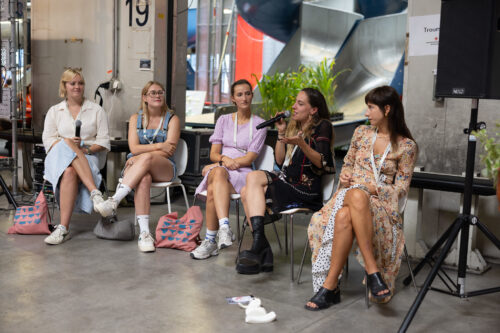
Creative Collision Talk: ISALA x ALMA Toolkit
Giulia Tomasello (IT), Leonore Vander Donck (BE), Caroline Dricot (BE), Joke Van Malderen (BE)
Creative Collider Talk @ Transformation Lounge invites two artistic activists to explore the source of creativity that actively transforms society. How to address the social stigma concerning intimacy and taboos related to the female body?
-

Creative Collision Talk: Urban Belonging Project x 300.000 Km/s
Ana Badenas (ES), Sofie Burgos-Thorsen (DK), Anders Koed Madsen (DK)
Creative Collision Talk @ Transformation Lounge invites two artistic activists to explore the source of creativity that actively transforms society. Can the arts, data science and democratic participation revive social, ecological and economic equities in our urban spaces?
-
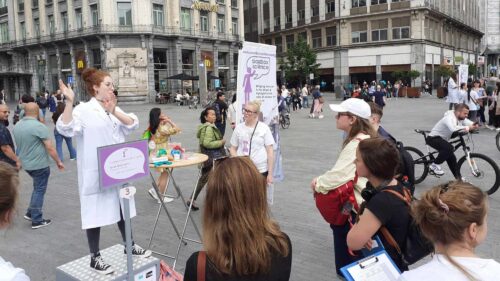
European Union Prize for Citizen Science Exhibition
Zum ersten Mal verleiht Ars Electronica im Namen der Europäischen Kommission den European Union Prize for Citizen Science. Die Ausstellung zeigt die Vielfalt und außergewöhnliche Kreativität der europäischen Citizen-Science-Initiativen.
-
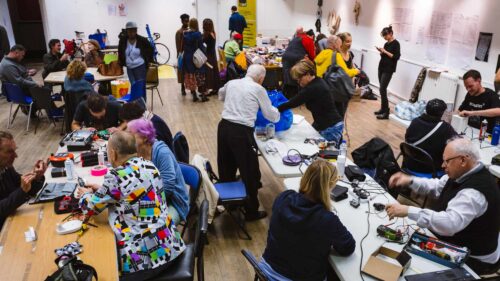
Meet-up: The Restart Project – What’s inside your smartphone?
Ugo Vallauri (IT), James Pickstone (UK
All our digital devices contain precious materials. Let’s fix our relationship with electronics, fight for the Right to Repair and slow down our consumption.
European Digital Deal
European Digital Deal continues Ars Electronica’s investigation into how the accelerated, yet at times unconsidered adoption of new technologies–such as artificial intelligence, machine learning, blockchain and algorithmic processing–can alter or undermine democratic processes. Through various programmes, European Digital Deal establishes a new kind of public forum where cultural institutions, artists, researchers and educators gather to reflect on what a deal that safeguards democratic values in the digital realm might look like, and the role they can play in shaping it.
Twelve artist residencies are at the heart of this forum to instigate conversations about the misgivings, risks and potential futures of digital technologies. These range from the present ethical threats they pose as they intersect with the media and public administration to visions of sustainable and ethical technologies for the future. At this year’s Ars Electronica Festival, experts and artists will work together to formulate the challenges these residencies will tackle. The artists will take part in an exchange offering their critical, artistic interpretations at the same time as sharpening their understanding of the logic governing the development and use of digital technologies in a capacity-building program. Numerous other educational events, festivals and exhibitions will open these topics for public debate. Based on these discussions, European Digital Deal will share a roadmap shedding light on the next steps of the digital transformation – a transformation that, albeit inevitable, is also intentional and designed for the common good.
-
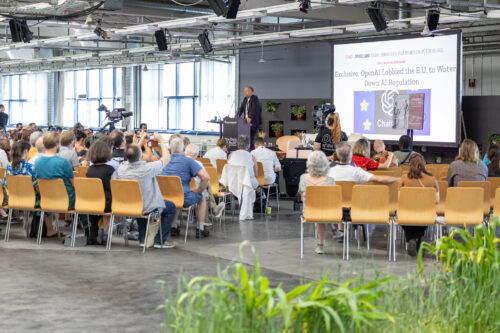
Ars Electronica Theme Symposium: End of Truth?
An EU DigitalDeal Conference
The knowledge revolution has a profound impact on our society. Through engaging lectures, interactive sessions and keynotes, we delve into the challenges of distinguishing fact from fiction in the digital age and explore the delicate relationship between technology, power dynamics, politics, and truth.
-
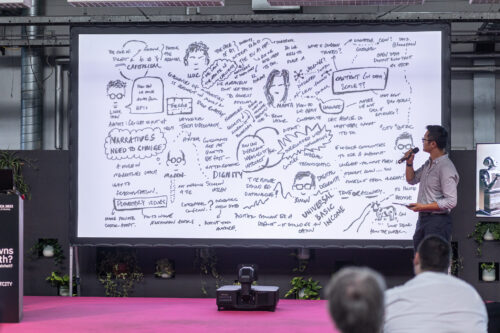
European Digital Deal Summit
European Digital Deal (EU)
The European Digital Deal is a three-year investigation co-funded by Creative Europe into how the accelerated, yet at times unconsidered adoption of new technologies—such as artificial intelligence, machine learning, blockchain and algorithmic processing—can alter or undermine democratic processes.
EMAP
The European Media Art Platform (EMAP) delves into the societal implications of technology, uniting diverse perspectives. Guided by the innovative and critical minds of artists, societal and ethical issues take center stage in the examination of the evolution of technology.
Initiated by werkleitz and co-funded by Creative Europe since 2018, EMAP is a consortium of fifteen leading European media art organizations specialized in Digital and Media Art, Bio Art and Robotic Art. EMAP members offer practitioners two-month residencies to undertake artistic research and critically examine technologies through their practices. EMAP also acts as a curatorial network that supports partners in selecting artists and works for their own festivals and exhibitions. In addition to production support for artists, EMAP provides an international platform to promote and disseminate the works of media artists.
The residencies are based on intercultural and interdisciplinary knowledge exchange between the selected artists, host organizations, and various experts from science, arts and technology. These experts are involved to consult, support or train the artists. Events take place regularly across Europe and within the Ars Electronica Festival, showcasing the works developed in the residencies. These include solo exhibitions and group shows, on- and offline conferences and capacity building workshops to share knowledge.
-
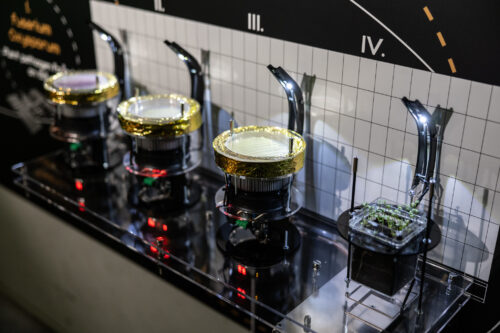
Biosymbiotic Exoskeleton
Dorotea Dolinšek (SI)
In diesem Projekt lenkt Dolinšek die Aufmerksamkeit auf unser Mikrobiom als ein Organ von großer Bedeutung für unser Überleben, nicht nur in einem ontologischen Sinn, sondern auch auf eine sehr persönliche, intime Weise. Unter so extremen Bedingungen wie im Weltraum bedeutet das am Leben-Sein eine Herausforderung des Lebens selbst.
-
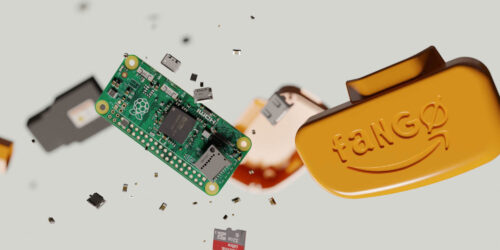
FANGØ a Facebook, Amazon, Netflix and Google Obfuscator
Martin Nadal (ES)
FANGØ ist eine Waffe zur Verteidigung gegen den Überwachungskapitalismus. Getarnt als Handy-Ladegerät, fungiert es als Mikrocontroller und übernimmt die Kontrolle des angeschlossenen Smartphones. Durch zufällige Suchanfragen und das Liken von zufälligen Social-Media-Beiträgen soll es Datenbroker täuschen und die Datenerfassung stören.
-

HC SVNT DRACONES
Juliane Jaschnow (DE), Stefanie Schroeder (DE)
Die Mehrkanalinstallation HC SVNT DRACONES ist eine Auskopplung aus der Recherche für einen stellenweise dreidimensionalen Film über Warnzeichen, Feedbackloops, fluoreszierende Vogelschwärme, Ewigkeitsschäden, Insect VR Cinema, Geologie und politische Systeme.
-
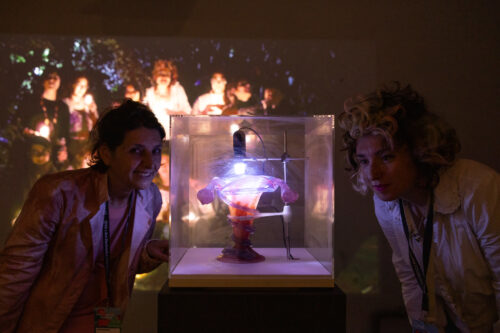
Organ Of Radical Care: Una Matriz Colaborativa
Charlotte Jarvis (GB), Dr. Patricia Saragüeta (AR)
Organ of Radical Care: Una Matriz Colaborativa nutzt neue wissenschaftliche Erkenntnisse, um aus dem Menstruationsblut von mehreren Frauen, trans- und nicht-binären Menschen eine kollaborative Gebärmutter zu züchten. Das Projekt wird durch Skulptur, Poesie und Video-/Audioinstallation kommuniziert.
-
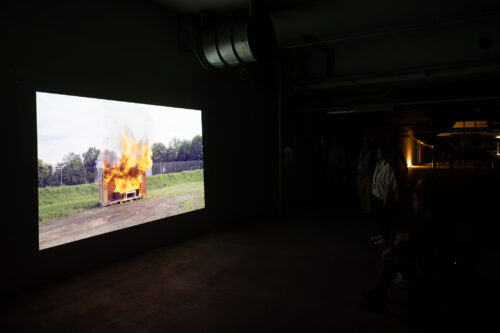
The Effect of Cannonry on Thunderclouds
Juliane Jaschnow (DE), Stefanie Schroeder (DE)
Ein Film über das Bild vom Sturm und den Sturm als Bild.
-
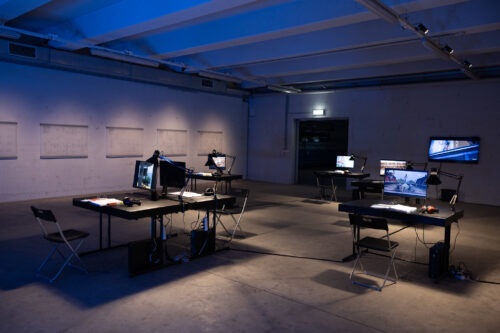
The Great Offshore
RYBN.ORG (FR)
The Great Offshore ist eine extradisziplinäre Untersuchung, die sich eingehend mit dem Phänomen der Offshore-Finanzierung befasst. Mit Hilfe bewährter Kunststrategien (von taktischen Medien bis zur Psychogeografie) hat das Künstlerkollektiv RYBN.ORG im Laufe mehrerer Forschungsreisen zu bekannten Offshore-Standorten akribisch Beweise gesammelt.
-

Total Conversion
Sasha Litvintseva (GB), Beny Wagner (DE/US)
Total Conversion untersucht die Verdauung als grundlegende Bedingung für das Dasein in der Welt, ein Prozess mit physiologischen, psychologischen, spirituellen, literarischen und wissenschaftlichen Dimensionen. Mehrere Handlungsstränge zeichnen die Poetik der Einverleibung als eine Angelegenheit von Metamorphose und Verfall, die Philosophie der Materie und der imperialen Eroberung, der Industrialisierung und der Vernichtung nach.
Realities in Transition
Extended Reality (XR) cradles both Virtual and Augmented Reality and offers enthralling technological possibilities as envisioned through concepts like the Metaverse. However, this emerging technology also poses significant new social and cultural challenges. The digital skills required for XR stand to deepen societal inequalities by exacerbating an already widening digital divide; moreover, the blurred line between reality and the virtual that is inherent to XR can easily become a hotbed for spreading misinformation and fostering social detachment.
Realities in Transition (RiT) brings together an active and critically thinking community of XR artists and practitioners to respond to these challenges. The project aggregates existing initiatives to demonstrate XR as a common good. Through supporting the production and dissemination of alternative uses of XR in a residency program, RiT unveils new narrative structures and creative processes that can counter the prevailing vision for the technology shaped by Big Tech. Alongside the aggregation of existing initiatives to demonstrate XR as a common good, RiT also develops an educational program to bring sustainable change by disseminating skills and knowledge to future generations of XR creatives.
RiT adopts methodologies aligned with the values of the commons, such as horizontality, open-sourcing and peer-to-peer learning. The project aspires to energize the XR community within Europe, not only the cultural and creative sector, but also civil society, academia, industry and policymakers, offering a counter-narrative. At this year’s Ars Electronica Festival, RiT’s Critical XR Manifesto (CXRM) is presented to the public for the first time.
-

Build your Own Virtual Avatar
Paula Strunden (AT)
Discover the world of embodied virtual world creation in this interactive workshop. You’ll learn how to create your own virtual avatar wearing VR headsets and using 3D modelling software Gravity Sketch and auto-rigging software Adobe Mixamo. Step beyond the conventional perception of virtual reality as an escape from reality and explore new forms of hybrid…
-
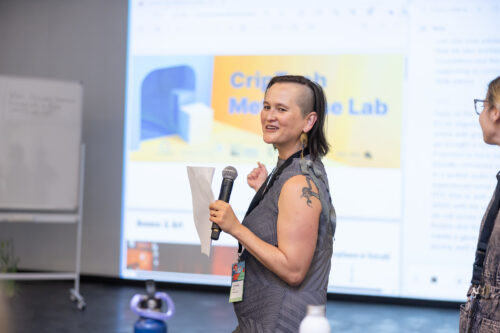
CripTech Lab: Metaverse Reclaimed
Vanessa Chang (US), Lindsey Felt (US)
Who owns the metaverse? XR is celebrated as a space of profound possibility where a user can transcend their physical limitations. Yet the reality is that the metaverse remains inaccessible to many. What would a metaverse, collaboratively built and governed, look and feel like? Using speculative storytelling and worldbuilding protocols, this design lab invites participants…
-
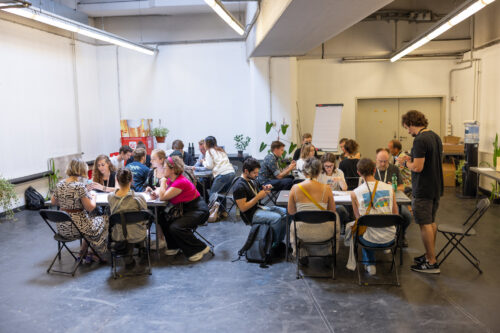
Critical XR Manifesto: Exploring ethical dimensions of XR
Boris Debackere (BE), Aurelie Delater (FR), Vanessa Hannesschläger (AT), Alisa Verbina (RU)
The Critical XR Manifesto workshop sets out to reimagine and expand on the current notions of XR while following a critical, reflective line of thought and envisioning a common, open, sustainable XR as promoted by the Realities in Transition project. The interactive workshop addresses XR artists and professionals from Europe and beyond, inviting them to…
